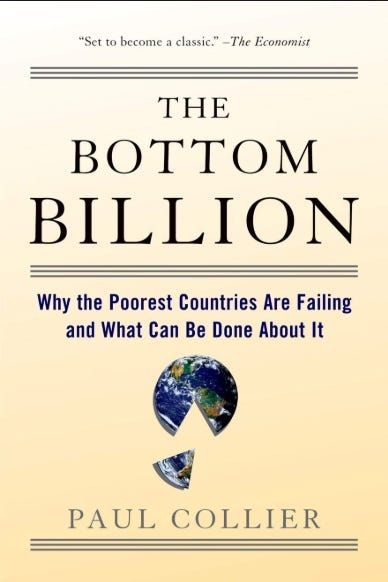War for Poverty

When a country is mired in poverty, violent revolution is the most emotionally appealing remedy. So cinematic. Since the powers that be almost never agree, any call for violent revolution is, in practice, a call for civil war. But how well does the “remedy” of civil war actually work? So far, the very best treatment I’ve found is contained within Paul Collier’s The Bottom Billion:
Civil war is development in reverse. It damages both the country itself and its neighbors. Let’s start with the country itself. Civil war tends to reduce growth by around 2.3% per year, so the typical seven-year war leaves a country around 15 percent poorer than it would have been…
Both economic losses and disease are highly persistent: they do not stop once the fighting stops. Most of the costs of civil war, perhaps as much as half, accrue after the war is over. Of course, sometimes the rebellion is worth it, with rebel victories ushering in an age of social justice, but this does not happen often. Usually the political legacy is about as bad as the economic legacy – a deterioration in political rights. A rebellion is an extremely unreliable way of bringing about positive change. Rebel leaders who claim to have launched a civil war for the good of their country are usually deceiving themselves, others, or both.
Furthermore, civil war breeds civil war:
Civil wars are highly persistent. The average international war, which is nasty enough, lasts about six months. You can do a lot of damage in six months. But the average civil war lasts more than ten times as long, even longer if you start off poor…
Having looked at why civil wars started and how long they lasted, we then looked at what happened when they were over. As previously noted, the end of a war often is not the end of the conflict; once over, a conflict is alarmingly likely to restart. Furthermore, the experience of having been through a civil war roughly doubles the risk of another conflict. Only around half of the countries in which a conflict has ended manage to make it through a decade without relapsing into war.
Along the way, Collier also heaps amusing scorn on the Third World’s indigenous war-mongers and their credulous First World apologists:
Our work has proved controversial. In part this is because the people attracted to the academic study of conflict tend to be politically engaged and are sympathetic to the acute grievances enunciated by various rebel movements, who often adopt extreme measures to oppose governments that may indeed be unsavory. To such academics, the whole idea of investigating statistically whether there is a relationship between objective measures of grievance and a propensity to rebel is taken to be more or less an insult, since they know there is one.
And:
[T]he rebel groups generate a discourse of grievance that feeds these concerns, in effect inviting fellow travelers to imagine themselves wearing bandoliers on the barricades. Unfortunately, you simply can’t trust the rebel discourse of concern for social justice; what else do you expect them to say?
A calm look at the data shows that this skepticism is well-justified:
Genuine grievances should be addressed whether or not they provoke rebellion, yet all too often they are not redressed. But the sad reality seems to be that grievances are pretty common. Rebels usually have something to complain about, and if they don’t they make it up. All too often the really disadvantaged are in no position to rebel; they just suffer quietly.
Peace lacks the romance of war, just as appeasement lacks the romance of rebellion. Yet if you really want desperate countries to escape poverty, you should hew to the path of peace. If appeasement is the price of peace, you should probably pay it. Civil war is a viable – though high-risk – strategy for power-hungry leaders. For countries, however, it is a path to wretched ruin.
The post appeared first on Econlib.



